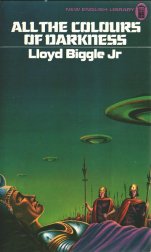
All the Colours of Darkness
Lloyd Biggle, Jr
204 pages
published in 1963
I first read Lloyd Biggle in translation, during the days when I read any book with that little squiggle on it that our local library used for science fiction books. I read a lot of crap that way, but also a lot of good books; those by Lloyd Biggle definately fall into the second category. Novels like Monument, The Still, Small Voice of Trumpets and The Fury out of Time were all part of my personal golden age; which is why I always keep an eye out for Biggle's books I haven't read yet, like All the Colours of Darkness.
It is 1986 and the Universal Transmitting Company is on the brink of finally having a working matter transmitter, after much mishaps and, the company fears, sabotage. Down to its last funds, its engineers finally succeed in getting a working machine that doesn't blow up after transmission and the company starts operating properly. Everything seems to go well on the day of opening, with thousands of people being transported from New York to Chicago, Hawaii or Europe. And then something goes wrong... A woman who leaves in New York does not arrive in Hawaii. At first the company thinks it's an accident, but then it happens again...
Enter Jan Darzek, detective, shareholder in the Universal Transmitting Company and friend of the head engineer. He is offered the task to find out who is behind the disappearances, what is causing them and stop them. When he spots one of the operatives he suspects will disappear he follows her into the transmitter in the Brussels station and disappears himself...
When he reappears he's on the moon and the people behind the disappearances turn out to be aliens... Jan Darzek now has the task to stop the aliens from their sabotage, without revealing their presence, after he has become convinced of their basic honour and honesty.
At the heart of All the Colours of Darkness lies this moral puzzle Darzek finds himself in. Through his rash actions when he is transported to the moon, he has condemned himself and them to a slow death by oxygen starvation. He has to find a way to save them all, without revealing the aliens presence, as their code of honour does not allow this; the soul of us humans is "the wrong kind of darkness" and these aliens are here specifically to stop us from travelling into the wider universe just yet; revealing their own presence would negate their mission.
There are no villains in this book: the aliens are on this mission as much out of concern for us as they are for themselves; they've taken pains in their sabotage to not harm people. Jan Darzek, on the other hand, after his initial reaction tries his best to save both himself and the aliens, when he could've easily saved himself and left them to die and thus fulfilling the mission he had accepted on behalf of the UTC. This is exactly the thing I liked in Biggle's other novels: the basic decency of his main characters and their reliance on brain over brawn. All the Colours of Darkness is exactly in line with novels like The Still, Small Voice of Trumpets.
As may guess, All the Colours of Darkness comes recommended highly, but be aware it is very much abook of its time: its 1986 is quite like the 1963 it was published in, just with American and Soviet bases on the Moon.
